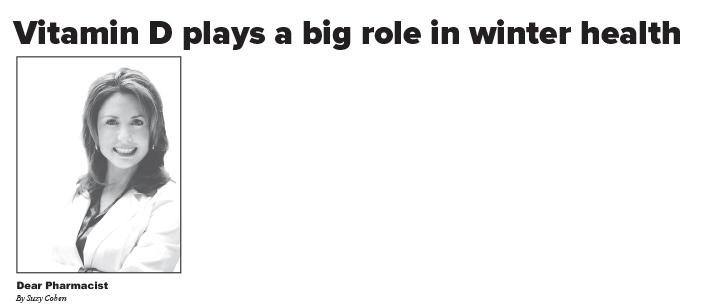

I’m willing to bet you have been sick in the past and experienced a runny nose and congestion, sneezing, fever/chills or body aches. All you can do is treat the symptoms and hope your immune system fights for you.
FYI, taking antibiotics won’t help. Your immune system strength (not the germ itself) directly influences how bad you feel and how long you suffer.
Vitamin D levels are lower during the winter months, so it’s no coincidence that cold and flu outbreaks happen more frequently during the wintertime. (Shockingly, even spending our summer days in a big city where tall buildings block the sun’s rays can lead to deficiencies of the vitamin.)
Vitamin D is a media darling. Time Magazine even lists D among its Top Ten Medical Breakthroughs.
In an American study of 198 healthy adults, researchers found that individuals with blood concentrations of 38 ng/ml or more of vitamin D enjoyed a two-fold reduction in the risk of catching cold, and were able to get back to work faster. I recommend even higher levels — closer to 60 ng/ml.
Two immune systems
Allow me to brief you on what may very well be vitamin D’s most exciting role yet. We all have both an adaptive and an innate immune system. The branch of our immune system that ‘remembers’ specific attackers — so that it can mount a faster defense next time an encounter is made — is called the “adaptive” immune system.
Vitamin D helps our adaptive immune system by boosting our T cells — a type of white blood cell that patrols around our bodies like soldiers, ready to destroy any infected or cancerous cells they come across.
Researchers in Denmark made a truly incredible connection. For T cells to be able to activate themselves and mount an attack, vitamin D must be present. Without adequate vitamin D, our T cells are like sleeping soldiers, virtually incapable of defending us.
This research suggests that perhaps we can retrain our immune system to prevent it from being so reactive and hyper, translating to a lower risk for cold and flu, and obviously fewer auto-immune assaults.
Adequate Vitamin D helps your immune cells manufacture your own natural antibiotic-like substance called cathelicidin, which destroys all sorts of ‘bugs’ as they’re encountered. This activity supports your innate immune system.
By the way, your innate system is your first line of defense against pathogens of all sorts, so if you get sick a lot, this is the part of your immune system that you should focus on.
Symptoms of vitamin D deficiency include fatigue, weakness, bone or muscle pain, fractures, cracked teeth, arrhythmias, wintertime depression and autoimmune flare ups. Certain cancers are also associated with low D levels.
In my humble opinion, Vitamin D3 is an affordable way to keep your immune system in tip-top shape. It’s easy to test your blood levels, and the supplement is sold pretty much everywhere.
This information is opinion only. It is not intended to treat, cure or diagnose your condition. Consult with your doctor before using any new drug or supplement.
Suzy Cohen is a registered pharmacist and the author of The 24-Hour Pharmacist and Real Solutions from Head to Toe. To contact her, visit www.SuzyCohen.com.